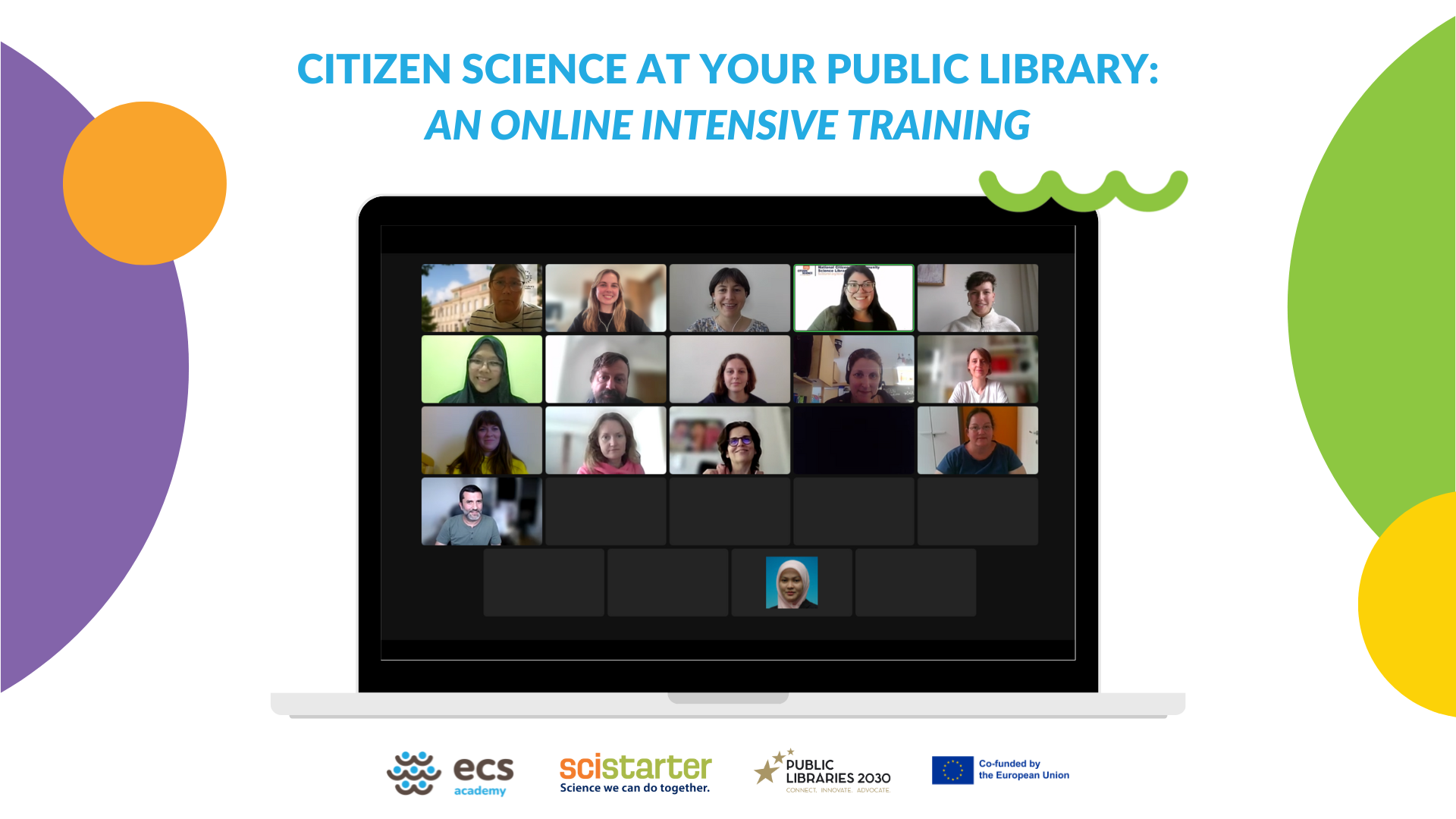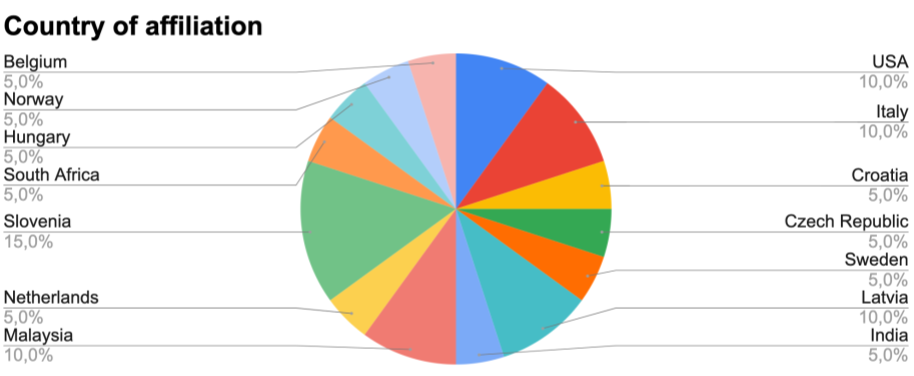
Public libraries and citizen science: takeaways from a pilot training course
Juliette Chalant
Aug. 15, 2024, 8:42 a.m.
In May 2024, 19 public libraries from all over the world attended an online intensive training within the context of the European Citizen Science (ECS) project to learn about citizen science and how public libraries have integrated, and can integrate, citizen science in their library.
Why public libraries for citizen science?
Public libraries have immense potential to become powerful hubs for citizen science initiatives and programmes. Given the vital role they occupy within their local communities, public libraries are perfectly placed to achieve one of the ECS project’s goals: widening and strengthening the European citizen science community. Collaborating with public libraries is crucial and strategic in achieving this because they are able to reach groups that other actors may not be able to. By incorporating citizen science initiatives, libraries can provide patrons with hands-on opportunities to contribute to scientific research while fostering a sense of community involvement and empowerment. Additionally, citizen science is a dynamic way of incorporating different approaches to knowledge by catalysing active participation.
Collaboration and elaboration of training
To further broaden engagement in citizen science within public libraries, Université Paris Cité (UPCité)/Learning Planet Institute, Public Libraries 2030 (PL2030) and SciStarter, an online community for public engagement in scientific research, collaborated on developing a one-day training module for public libraries on how to engage and develop citizen science (CS) activities in their public library.
Public libraries were invited to participate in the ECS project to produce two outcomes: (1) the organisation of local community events on citizen science in the public libraries; (2) participate in focus groups to help inform and develop a one day training module on how public libraries can integrate citizen science in their activities. To do this, PL2030 recruited 10 public libraries from its network of innovative ‘Lighthouse Libraries’ to join the ECS project and organise community events on different citizen science topics. These libraries come from: Aarhus (Denmark), Sibiu (Romania), Lisbon (Portugal), Valmiera (Latvia), Veria (Greece), Helsinki (Finland), Ljubljana (Slovenia), Kranj (Slovenia), Wiener Neustadt (Austria), and Kudoza-Zdroj (Poland).
In September and October 2023, two focus groups were carried out by UPCité/Learning Planet Institute, who is responsible for developing the European Citizen Science Academy within the ECS project. The focus groups focused on understanding training needs of public libraries to carry out citizen science activities in various contexts. The second focus group focused on working with public libraries to evolve the already existing SciStarter course for public libraries on citizen science entitled “Libraries as Community Hubs for Citizen Science”.
Following this, SciStarter and the ECS Academy paired up to develop a one-day training module. This course was co-designed via regular meetings to shape the module, informed by SciStarter’s original course and the focus groups carried out by UPCité/Learning Planet Institute. In addition, new material was created, such as case studies of public libraries that use citizen science via interviews.
Click here to discover the course module and slides of the training.
Implementing the training
To allow for librarians from both European and North American time zones to participate, the training was split into two half-day online training sessions, which took place on May 15 and May 22, 2024. The training provided participants with a refresher on citizen science before diving into research and practice, community hubs for citizen science, and presented four case studies of citizen science projects taking place in public libraries in both Europe and the United States. The first day concluded with a Q&A and some ‘homework’ for participants (see the reflection and planning tool). The second part of the training started with a review of the first training, presented participants with resources for planning their activities (as showcased on SciStarter), and included a public library panel and Q&A with librarians from the United States and Slovenia on their citizen science projects. An additional open optional ‘check-in’ call was organised between the two trainings for public libraries to ask the project partners any questions they might have.
Over the course of the two sessions, this pilot welcomed 25 participants from 14 countries, including Slovenia, Malaysia, the USA, Latvia, and Italy.

Graph 1: Participants distribution of affiliations by country
Institutional integration of citizen science in public libraries
When registering for the training, participants were asked to complete a survey about their organisation’s institutional commitment to implementing citizen science across four key areas: support resources and infrastructure, education and awareness, research and policy, and assessment. These four intervention areas were developed by TIME4CS, a European funded project focusing on institutional integration of citizen science for research performing organisations (e.g. universities).
The survey revealed that most organisations lacked institutional support for citizen science. The most significant shortfall was in support for research activities related to citizen science, with 52.9% of respondents indicating a lack of support in this area, including insufficient staff dedicated to citizen science activities. Policy and assessment were also weak points, with 60% of respondents reporting that citizen science was not part of their institution’s strategy or considered in researchers’ evaluations. The area with the most positive answers was support for resources and infrastructure, with 26.7% of respondents indicating their organisations provided adequate support in this regard.
Feedback & takeaways from participants
60% of the participants evaluated the course and overall agreed that the training was useful and relevant. Participants’ feedback showed that many found the training to be highly resourceful and useful in regard to their own work and future perspectives within their libraries. When asked to indicate to which extent they identified with the following statements, participants strongly agreed with “being able to explain what citizen science is” as well as with “feeling confident about having enough knowledge to organise citizen science activities in [their] library”.
On the second day of the training, two librarians were invited to share how they developed citizen science activities within their public libraries: Lise Mitchel (Grand Ledge Public Library, Michigan, United States), and Saša Vidmar (France Bevk Public Library, Nova Gorica, Slovenia). This allowed for participants to hear directly from the librarians, gain insights from their experience, and ask questions on the successful implementation of citizen science within their public libraries. These presentations were greatly appreciated, as one participant noted, “I also loved that two librarians already involved in citizen science were able to share their experiences directly”. This interest in real-life case studies (such as the France Bevk Public Library’s Seed Library) was evident in the evaluation, with participants expressing their desire for additional guest speakers to share their experiences.
The sessions were built to allow both practice and discussion, throughout the training, participants were invited to share their experiences with citizen science and reflections on the proposed exercises. These moments allowed room to foster connections among participants, and networking for further collaboration and support within the public library sector. In fact, all participants expressed their interest in joining a network for public libraries for citizen science, and over 70% showed interest in joining a post-training meeting to share their experience and progress in implementing citizen science in their library.
Confidence is key to implementing new projects. Participants pointed out the training’s impact on fostering this confidence, saying, "I most appreciated learning about the way that libraries can participate [...] It makes beginning feel more doable and less intimidating".
What’s next?
Using the feedback collected from participants after the course, SciStarter and the ECS Academy will fine-tune the content and begin the process of creating an online self-paced course. A second training course is set to be organised in 2025. Additionally, inspired by the added value witnessed from bringing together library professionals interested in citizen science from all over the world, SciStarter and PL2030 will begin collaborating on connecting European and American public libraries around the topic of citizen science – more specifically, this will centre around citizen science month in April 2025.
In parallel to this, the 10 public libraries taking part in the ECS project are currently organising their citizen science-related events, and will gather in Ljubljana, Slovenia in October 2024 for an in-person meeting to share experiences and best practices. Stay tuned on the ECS website and blog for more on this!
Interested in signing up for the SciStarter network? Click here to join.
Are you a public library carrying out citizen science activities? We are looking to build a collection of case studies on citizen science activities taking place in public libraries for the training course material. Interested in contributing to this? Please contact us at: clea.montanari@learningplanetinstitute.org
This article is a collaboration between Cléa Montanari (Learning Planet Institute, Paris), Jesse Labenne (Learning Planet Institute, Paris), Tara Cox (SciStarter), and Juliette Chalant Devlesaver (PL2030).